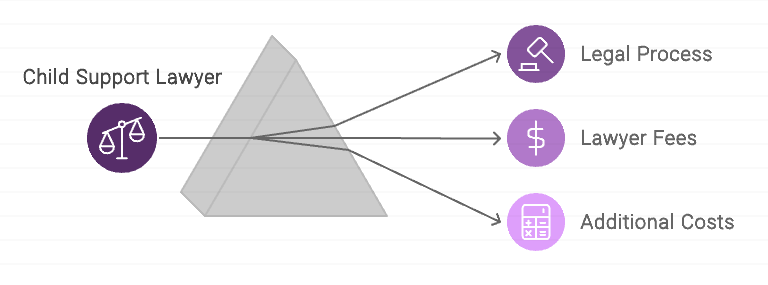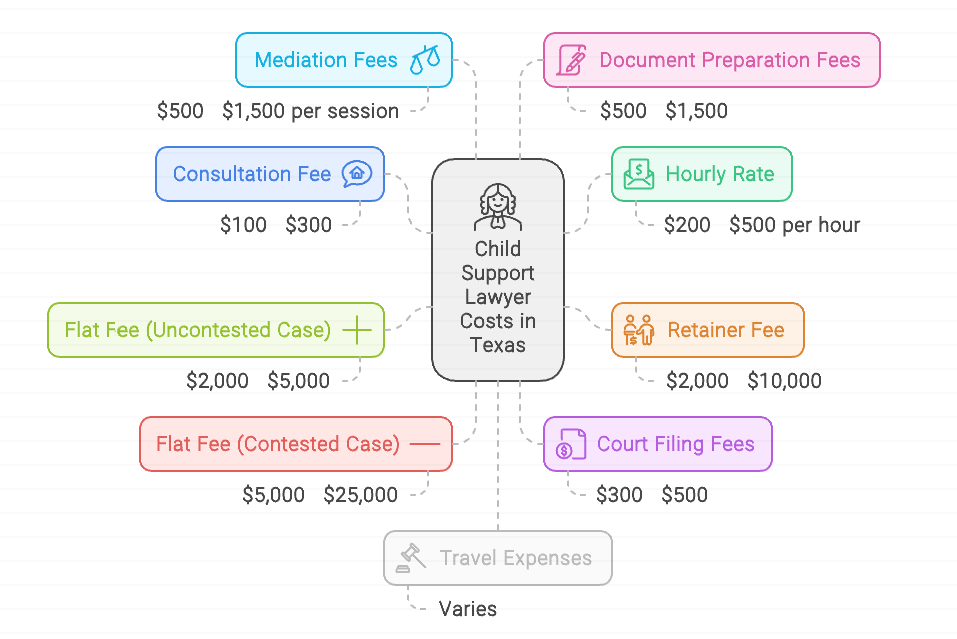Child Support Lawyer Cost in Texas
The various guidelines and laws governing child support can be very complicated and will differ depending on the state or jurisdiction. In addition, there may be federal laws that may also apply in lieu of or in addition to state statutes. In order for a parent to navigate these maze-like rules and elaborate procedures, it may be a good idea to avail of the services of an experienced Houston child support lawyers.

In this post, we will explore the cost of child support lawyers and what factors can affect the price. We’ll also share some tips on how to find an affordable child support lawyer without compromising on quality. Whether you’re a custodial parent seeking child support or a non-custodial parent seeking to modify an existing agreement, this post will help you understand what to expect regarding the cost of hiring a child support lawyer.
Child Support Lawyers Services
Child support lawyers are legal professionals who specialize in handling child support and custody cases. Their expertise and knowledge of family law make them invaluable allies in ensuring that the best interests of the child are protected.
- Providing a zealous representation of the parent’s interests in court
- Entering into negotiations on behalf of the parent
- Filing documents correctly and within the time limits set by the state
- Helping a parent in establishing the child’s paternity
- Making clear the specific terms of a child support order
- Requesting a modification of a child support order
- Collecting and enforcing child support payments
- Calculating the expected amount of child support payments
- Assisting the parent in determining the most efficient payment method
- Protecting the child’s right to entitled benefits and public education
These lawyers play a vital role in advocating for their clients and representing them in court proceedings. They help parents understand their rights and obligations regarding child support, guide them through the legal process, and ensure they are treated fairly. Moreover, child support lawyers can provide valuable advice on negotiating child support agreements, modifying existing orders, or enforcing court-ordered payments.
Cost of lawyer
Many child support attorneys charge a flat fee for rendering straightforward services, such as filing a request to modify a child support amount. Other lawyers provide their services at an hourly rate. In most cases, child support lawyers can cost parents between $100 and $500 per hour. To accurately assess the total expenses, a parent should clarify whether court costs and filing fees are included in the fees charged by the lawyer.
Here’s a table outlining the typical costs associated with hiring a child support lawyer in Texas:
Service Type |
Cost Range |
Description |
|---|---|---|
Consultation Fee |
$100 – $300 (one-time) |
Initial consultation fee to discuss the case and legal options. |
Hourly Rate |
$200 – $500 per hour |
The standard rate for services rendered by the lawyer is billed hourly. |
Retainer Fee |
$2,000 – $10,000 (upfront) |
A deposit is paid upfront to secure the lawyer’s services, often based on the case’s complexity. |
Flat Fee (Uncontested Case) |
$2,000 – $5,000 |
This is for straightforward cases where both parties agree on terms without court intervention. |
Flat Fee (Contested Case) |
$5,000 – $25,000 |
This is for more complex cases that require court appearances and negotiations. |
Court Filing Fees |
$300 – $500 |
Fees are required to file documents with the court. |
Mediation Fees |
$500 – $1,500 per session |
If required, the cost for sessions with a mediator as part of the legal process. |
Document Preparation Fees |
$500 – $1,500 |
Fees for drafting and preparing legal documents like motions, affidavits, and other court submissions. |
Travel Expenses |
Varies |
Additional costs if the lawyer needs to travel for the case are usually charged per mile or at a flat rate. |
Expert Witness Fees |
$1,000 – $5,000 per expert |
Fees for bringing in expert witnesses to support the case in court. |
Hourly rates vs. flat fees: Pros and cons
When hiring a child support lawyer, understanding the cost structure is crucial. One of the main decisions you’ll have to make is choosing a lawyer who charges hourly rates or offers flat fees. Each option has pros and cons:
Hourly rates are a common billing method used by many lawyers. With this approach, you will be charged for the time spent by the lawyer and their team working on your case. The advantage of hourly rates is that you only pay for the time and effort put into your specific needs. This can be beneficial if your case is relatively straightforward and requires minimal legal assistance. However, it’s important to remember that if your case becomes more complex or unexpected issues arise, the costs can quickly add up. Hourly rates can sometimes lead to uncertainty about the final bill, as it’s difficult to predict the exact amount of time required to resolve your case.
On the other hand, flat fees provide a clear and upfront cost for the legal services you will receive. With a flat fee arrangement, you and your lawyer agree on a fixed amount to cover all the necessary work for your child support case. This can be advantageous for budgeting purposes, as you know exactly what to expect regarding expenses. Additionally, if your case becomes more complicated or time-consuming than initially anticipated, you won’t have to worry about incurring additional charges. However, it’s important to ensure that the flat fee agreement covers all the necessary services and potential scenarios that may arise during your case.
Houston Divorce Lawyer Flat Fee
Some child support lawyers charge a flat rate for services such as filing a petition for modification or other straightforward matters. Parents should ask whether filing fees and court costs are included in the lawyer’s retainer or hourly rate.
In an amiable and uncontested child support case, a parent may incur legal fees from $2000 to $4000. More acrimonious cases often involve greater time and effort from attorneys and more time in court, which will increase the total legal expenses. For these cases, the costs may reach up to $25000.
Free or low-cost lawyers
Not everyone can afford to pay the steep rates that a good and experienced lawyer often charges, but there is available child support help for fathers who do not have the financial means to afford them. For parents who have very little income, it may be a good idea to contact the American Bar Association and Legal Aid, which may be able to offer legal representation and resources at a low cost or even at no cost at all. There may also be other organizations within the state that can provide free lawyers for child support, which can be discovered online.

In some states, when a non-custodial parent is held on contempt charges for failure to comply fully with child support orders, the state may be required to provide a lawyer free of charge just like it has to for every other defendant who is arrested and charged. This applies especially to child support offenses that may be punishable by jail time.
In the most basic sense, child support is intended to provide necessities for children. It is not intended to compensate or punish either spouse in the course of dissolving a marriage. Necessities include food, shelter, clothing, and education.
Today, the most hotly contested legal issue is almost always the amount of support due, with paternity rendered a simple matter of science with the advent of DNA testing. The basis for continued support lies in the unquestioned tradition of holding parents jointly responsible for supporting and protecting the children produced by their marriage.
Child Support Guidelines
Almost all states enacted child support guidelines as an integral part of family law codes. As guidelines, the amounts normally required may be altered, up or down, according to the special needs and circumstances of the parties involved. Most often, amounts due are calculated as a percentage of income. The spouse who receives custody of the children receives payments monthly from the non-custodial spouse.
Child Support Modification
Ultimately, the court determines the number of payments due after balancing the parties’ interests and abilities. The amount is included in the final orders issued by the court, and in the event of non-payment, this final order will support a motion for contempt and possible incarceration.
Additional expenses and potential hidden costs
When going through a child support case, it’s important to consider the fees of hiring a child support lawyer and the potential additional expenses and hidden costs that may arise during the process. While the lawyer’s fees are a significant factor, it’s crucial to be aware of other financial obligations that may come into play.
Research
Another potential expense is gathering the necessary documentation and evidence to support your case. This may include obtaining financial records, medical records, school records, and any other relevant documents. Depending on the complexity of your situation, you may need to hire professionals such as financial experts or private investigators to assist in collecting this information.
Expert witnesses
In some cases, it may be necessary to bring in professionals such as psychologists, social workers, or child custody evaluators to provide expert opinions and testify on your behalf. These experts often charge fees for their services, which can significantly add to the overall cost of your legal representation.
Court Fees
Additionally, there may be expenses related to court filings, document preparation, and serving legal documents to the opposing party. These costs can vary depending on your case’s jurisdiction and complexity.
Alternatives to hiring a child support lawyer
While hiring a child support lawyer can be beneficial in many cases, it’s essential to know that alternatives are available if you’re unable or unwilling to go down that route. These alternatives can help you navigate the complexities of child support without incurring the costs of hiring a lawyer.
- Mediation: Mediation involves both parents and a neutral third party working together to reach an agreement on child support. This alternative allows open communication, compromise, and finding common ground. Mediation can be a cost-effective option compared to hiring a lawyer, as it eliminates the need for lengthy legal proceedings.
- Self-Representation: If you have a good understanding of child support laws and are willing to put in the time and effort to research and prepare your case, representing yourself may be a viable option. This alternative requires thorough knowledge of the legal system, familiarity with relevant laws, and the ability to present your case effectively.
- Online Resources: Various online resources provide valuable information and tools to help you navigate the child support process. These resources can assist you in understanding the laws, calculating child support amounts, and completing the necessary paperwork. While they cannot provide personalized legal advice, they can be a valuable starting point for those needing to handle their child support matters independently.
- Legal Aid Services: If you meet certain income eligibility requirements, you may be eligible for free or reduced-cost legal aid services. Non-profit organizations provide these services and can offer guidance, advice, and representation in child support cases. Legal aid services can be cost-effective for those who cannot afford private legal representation.
Balancing cost and quality in legal representation
While cost is undoubtedly significant, it should not be the sole determining factor when choosing a child support lawyer. Quality legal representation can save you time, money, and emotional stress in the long run. Therefore, it is important to carefully weigh the cost against the potential benefits and overall value that a reputable and experienced child support lawyer can offer.

Finding the right child support lawyer requires a careful balance between cost and quality. While it may be tempting to opt for the cheapest option, investing in a reputable and experienced lawyer can significantly increase your chances of achieving a fair resolution in your child support case. Remember, the well-being and future of your child are at stake, so make your decision wisely and prioritize the quality of legal representation.
FAQs about Child Support Lawyer Cost
Who pays attorney fees in child support cases Texas?
Generally, the parent obligated to pay child support is responsible for paying their own attorney’s fees. The court may also order that both parents pay the fee, depending on the circumstances of each case. It is important to note that when a parent applies for services with the Attorney General of Texas, no attorneys’ fees will be involved.
How much is child support in Texas?
Child support in Texas is determined according to several factors, such as the number of children, the income of both parents and costs associated with raising the child, among other considerations. The minimum amount a parent can pay in child support is $50 per month, but there is no set maximum amount.
Do I need an attorney for child support Texas?
While it is not required by law to hire an attorney for a child support case in Texas, it is highly recommended. An experienced child support lawyer can provide legal advice and represent your best interests.
How much is a family lawyer in Texas?
The cost of a family lawyer in Texas varies depending on experience, location, and specialty. Generally, attorney fees range from $150 to $500 per hour. However, fees can run higher if the case requires significant litigation or extensive research.
What is the most child support can take?
In Texas, a court-ordered child support award cannot exceed a child’s total spending needs. There are also statutory cap limits based on the number of children being supported—for instance, if you have two or more children, the court can order up to $10,000 per month in child support payments.
How much can child support take from paycheck in Texas?
Generally, child support payments must be deducted from an obligor’s paycheck each month. A maximum of 50% of disposable earnings can be withheld from any paycheck for current child support payments. However, this limit may be increased if arrearages are owed from prior payments.
Can a mother take a father off child support in Texas?
Yes – if the parents agree to terminate the court-ordered obligation, they can stipulate in writing and submit it to the court for approval. Once approved, the court order will be terminated, and the father will no longer be legally obligated to make payments.
How much back child support is a felony in Texas?
According to Texas state law, owing at least $20,000 or two years’ worth of unpaid back child support is considered a felony offense. If convicted, the defendant could face felony charges and jail time.
Do you pay child support with 50-50 custody in Texas?
Typically, if both parents share equal physical custody of a minor child (50/50), then no individual parent must pay the other parent’s child support payments. However, each parent is still jointly liable for all financial obligations related to rearing the child (e.g., health care expenses).
How much should a father pay for child support in Texas?
The amount of child support a father must pay in Texas depends on several factors, including his gross annual income and the number of children he supports. The Texas Child Support Guidelines provide specific calculations for determining appropriate payment amounts.
Can I sue my father for never paying child support in Texas?
Yes – if your father fails to meet his court-ordered obligation to pay child support, you can file a lawsuit against him to recover those payments. It is important to note that parents are equally responsible under Texas law for meeting the financial needs of their children.
Can you negotiate back child support in Texas?
Yes – back child support payments can be negotiated through mediation or a settlement agreement between the parties outside of court. It is important to note that even if an agreement is reached, a judge must still approve it before it becomes valid and enforceable.
